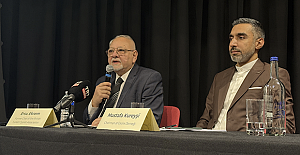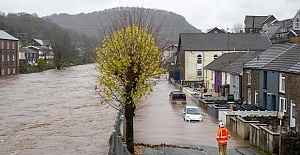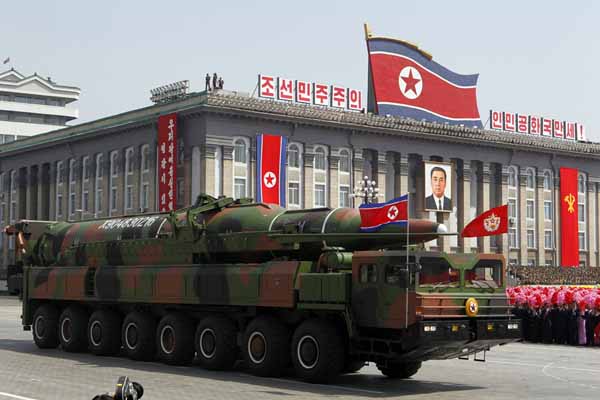North Korea issued its latest belligerent threat Saturday, saying it has entered "a state of war" with South Korea a day after its young leader threatened the United States because two American B-2 bombers flew a training mission in South Korea. Analysts say a full-scale conflict is extremely unlikely and North Korea's threats are instead aimed at drawing Washington into talks that could result in aid and boosting leader Kim Jong Un's image at home. But the harsh rhetoric from North Korea and rising animosity from the rivals that have followed UN sanctions over Pyongyang's Feb. 12 nuclear test have raised worries of a misjudgment leading to a clash. In a joint statement by the government, political parties and organizations, North Korea said Saturday that it will deal with all matters involving South Korea according to "wartime regulations." It also warned it will retaliate against any provocations by the United States and South Korea without "any prior notice."
The divided Korean Peninsula is already in a technical state of war because the 1950-53 Korean War ended in a cease-fire, not a peace treaty. But Pyongyang said it was scrapping the war armistice earlier this month.
South Korea's Unification Ministry released a statement saying the latest threat wasn't new and was just a follow-up to Kim's earlier order to put troops on a high alert in response to annual US-South Korean military drills. Pyongyang sees those drills as rehearsals for an invasion; the allies call them routine and defensive.
In an indication North Korea is not immediately considering starting a war, officials in Seoul said South Korean workers continued Saturday to cross the border to their jobs at a joint factory park in North Korea that's funded by South Koreans
On Friday, North Korean leader Kim Jong Un warned his forces were ready "to settle accounts with the U.S." after two nuclear-capable U.S. B-2 bombers dropped dummy munitions on a South Korean island range as part of joint drills and returned to their base in Missouri.
North Korean state media later released a photo of Kim and his senior generals huddled in front of a map showing routes for envisioned strikes against cities on both American coasts. The map bore the title "U.S. Mainland Strike Plan."
At the main square in Pyongyang, tens of thousands of North Koreans turned out for a 90-minute mass rally in support of Kim's call to arms. Small North Korean warships, including patrol boats, conducted maritime drills off both coasts of North Korea near the border with South Korea earlier this week, South Korean Defense Ministry spokesman Kim Min-seok said in a briefing Friday. He didn't provide details.The spokesman said South Korea's military was mindful of the possibility that North Korean drills could lead to an actual provocation. He said the South Korean and U.S. militaries are watching closely for any signs of missile launch preparations in North Korea. He didn't elaborate.
Experts believe North Korea is years away from developing nuclear-tipped missiles that could strike the United States. Many say they've also seen no evidence that Pyongyang has long-range missiles that can hit the US mainland.
Still, there are fears of a localized conflict, such as a naval skirmish in disputed Yellow Sea waters. Such naval clashes have happened three times since 1999. There's also danger that such a clash could escalate. Seoul has vowed to hit back hard the next time it is attacked.
"The first strike of the revolutionary armed forces of the DPRK will blow up the U.S. bases for aggression in its mainland and in the Pacific operational theatres including Hawaii and Guam," the North said Saturday in the statement carried by the official Korean Central News Agency. DPRK stands for the Democratic People's Republic of Korea, the North's official name.


 After Nesil Caliskan a by-election will be held in Jubilee ward in Enfield
After Nesil Caliskan a by-election will be held in Jubilee ward in Enfield Publishing the analysis, Labour’s Cllr Ergin Erbil said Everybody in Enfield deserves basic rights
Publishing the analysis, Labour’s Cllr Ergin Erbil said Everybody in Enfield deserves basic rights Gaza-Israel conflict Statement from Cllr Ergin Erbil, Leader of Enfield Council
Gaza-Israel conflict Statement from Cllr Ergin Erbil, Leader of Enfield Council Cllr Ergin Erbil was elected as the new Leader of Enfield Council
Cllr Ergin Erbil was elected as the new Leader of Enfield Council History of the Turkish Cypriot People symposium held in London
History of the Turkish Cypriot People symposium held in London Asia's most famous and powerful 100 women award given to WFPA President Naziya Bisenova
Asia's most famous and powerful 100 women award given to WFPA President Naziya Bisenova Death toll climbs to 5 as powerful Storm Bert batters Britain
Death toll climbs to 5 as powerful Storm Bert batters Britain Turkish students are unable to obtain visas from the Italian Consulates
Turkish students are unable to obtain visas from the Italian Consulates Footballers are celebrating after Enfield Council officially opened a pitch
Footballers are celebrating after Enfield Council officially opened a pitch  Pep Guardiola's Manchester City beaten by Juventus
Pep Guardiola's Manchester City beaten by Juventus Chelsea to meet Arsenal in Sunday's London derby
Chelsea to meet Arsenal in Sunday's London derby Fenerbahce vs Manchester United Predicted line-ups! Jose Mourinho faces former side
Fenerbahce vs Manchester United Predicted line-ups! Jose Mourinho faces former side UK economy had zero growth between July and September
UK economy had zero growth between July and September Shape the future of housing services with The Enfield 500
Shape the future of housing services with The Enfield 500 DOUBLE-CAB PICKUPS TO BE CLASSED AS CARS UNDER NEW HMRC POLICY
DOUBLE-CAB PICKUPS TO BE CLASSED AS CARS UNDER NEW HMRC POLICY Guide to Selling Hoodies with Imprinted Book Quotes
Guide to Selling Hoodies with Imprinted Book Quotes















